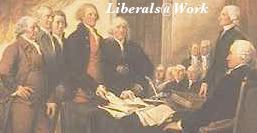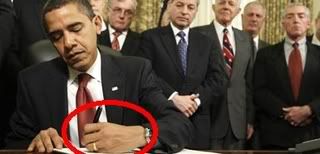Clinton vows to stay in race "until there's a nominee."
Which apparently will be in about two weeks.
Democracy is a great thing, and generally that's that's what we participate in when selecting a nominee for a major political party. However, by now even those who didn't pay attention to your social studies teachers understand that the primaries are only an exercise in representative democracy in a pro forma way.
What with "Super Delegates," rules made and broken behind closed doors, campaign finance laws thwarted, "street money," and the inordinate influence of the corporate media, you can't miss the fact that there's a lot more afoot than simply one-person, one-vote.
And that's okay. It's all good because it all moves towards something more important that which candidate "wins." It builds a consensus.
As in most things in America, it starts and ends with money. It takes millions to even get a foothold in the early primary states, and the first major contest that the media reports on is months before any straw polls are taken. The end of the first quarter financial reporting deadline is examined with a fine tooth comb -- even to the point of documenting just how much a candidate spends on combing his or her hair -- much to John Edwards chagrin.
Until we found out about $400 hair cuts, we also assumed that Hillary Clinton had an enormous if not insurmountable advantage in cash, especially since she was able to transfer millions from her Senate campaign to her presidential run. But when the numbers came out the narrative changed when Obama proved what a formidable fund-raiser he was.
The chattering class chattered, the donors took note, the Clinton machine was vulnerable! At this point many of the super delegates who weren't with Hillary from the start froze and we all watched the back and forth as momentum built for Obama. He won Iowa, Hillary a distant third, and the chattering class chattered about momentum and polls that would crown a new inevitability in New Hampshire.
And they were wrong, and they were burned, and the supers remained frozen, and the battle was on because the people hadn't made up their minds. Burned once, the media discounted Obama's huge South Carolina win. Looking for trends, examining demographics in exit polls for an explanation, not trusting conventional or unconventional wisdom and astonished at how evenly matched the talking heads sounded to each other when they talked to themselves, they froze.
The supers hid, the money flowed, and after Tsunami Tuesday, with only a slight lead in states won and delegates awarded, nobody was ready to come close to declaring an advantage even though half the nation had spoken. By then both Obama and McCain had only won two more states than their second-place rivals. But where Obama only edged Clinton out by 12 delegates that day, McCain claimed 401 more delegates in a Party that only has about half as many at stake as the Democrats select via popular vote. (Oh yeah, they have super delegates too.)
Then as now, with Obama's win-streak prior to their tie in Texas and Hillary's win in Ohio -- a win big enough to freeze the narrative once again about anything being "clear" although even then Obama's lead was formidable enough that we knew she needed a miracle -- there was no consensus among Democrats who we would (or should) get behind.
"Winning" the primaries does not equate to a winning candidate in the fall. A united party is what it takes. If it were simply just about winning and not building a consensus, conventions would still be free-for-alls and not marketing devices. Stage one was the media declaring a victor, giving the supers cover upon coming out even if deciding against the indications of their own constituents.
Now, with more undeclared super delegates than pledged delegates at stake in the coming weeks, the dog and pony shows staged for the benefit of us riff-raff who's only power is our vote, is over. The democratic nomination now lies in the hands of those who always controlled things -- the media (who made up their minds as soon as their Grand Poobah Tim Russert declared Obama a winner), the politicians and the big money folks who are as influential as ever.
The party leaders' new roll, including all of the winning and losing candidates, is to form a narrative that will rally us around the winner and bring the losers back into the fold, to wean the media off the horse-race coverage to a more thematic story before they go back to covering this fall's horse race.
For the rest of us, much as you may hate the process that is so far removed from what they taught you about in grammar school, opting out is not an option.
[You can read more of Mark Adams' work at his blog, Dispassionate Liberal]
Which apparently will be in about two weeks.
"Not long after the polls close in the May 20 Kentucky and Oregon primaries, Barack Obama plans to declare victory in his bid for the Democratic presidential nomination.
"And, until at least May 31 and perhaps longer, Hillary Clinton’s campaign plans to dispute it.
"It’s a train wreck waiting to happen, with one candidate claiming to be the nominee while the other vigorously denies it, all predicated on an argument over what exactly constitutes the finish line of the primary race."
Democracy is a great thing, and generally that's that's what we participate in when selecting a nominee for a major political party. However, by now even those who didn't pay attention to your social studies teachers understand that the primaries are only an exercise in representative democracy in a pro forma way.
What with "Super Delegates," rules made and broken behind closed doors, campaign finance laws thwarted, "street money," and the inordinate influence of the corporate media, you can't miss the fact that there's a lot more afoot than simply one-person, one-vote.
And that's okay. It's all good because it all moves towards something more important that which candidate "wins." It builds a consensus.
As in most things in America, it starts and ends with money. It takes millions to even get a foothold in the early primary states, and the first major contest that the media reports on is months before any straw polls are taken. The end of the first quarter financial reporting deadline is examined with a fine tooth comb -- even to the point of documenting just how much a candidate spends on combing his or her hair -- much to John Edwards chagrin.
Until we found out about $400 hair cuts, we also assumed that Hillary Clinton had an enormous if not insurmountable advantage in cash, especially since she was able to transfer millions from her Senate campaign to her presidential run. But when the numbers came out the narrative changed when Obama proved what a formidable fund-raiser he was.
The chattering class chattered, the donors took note, the Clinton machine was vulnerable! At this point many of the super delegates who weren't with Hillary from the start froze and we all watched the back and forth as momentum built for Obama. He won Iowa, Hillary a distant third, and the chattering class chattered about momentum and polls that would crown a new inevitability in New Hampshire.
And they were wrong, and they were burned, and the supers remained frozen, and the battle was on because the people hadn't made up their minds. Burned once, the media discounted Obama's huge South Carolina win. Looking for trends, examining demographics in exit polls for an explanation, not trusting conventional or unconventional wisdom and astonished at how evenly matched the talking heads sounded to each other when they talked to themselves, they froze.
The supers hid, the money flowed, and after Tsunami Tuesday, with only a slight lead in states won and delegates awarded, nobody was ready to come close to declaring an advantage even though half the nation had spoken. By then both Obama and McCain had only won two more states than their second-place rivals. But where Obama only edged Clinton out by 12 delegates that day, McCain claimed 401 more delegates in a Party that only has about half as many at stake as the Democrats select via popular vote. (Oh yeah, they have super delegates too.)
Then as now, with Obama's win-streak prior to their tie in Texas and Hillary's win in Ohio -- a win big enough to freeze the narrative once again about anything being "clear" although even then Obama's lead was formidable enough that we knew she needed a miracle -- there was no consensus among Democrats who we would (or should) get behind.
"Winning" the primaries does not equate to a winning candidate in the fall. A united party is what it takes. If it were simply just about winning and not building a consensus, conventions would still be free-for-alls and not marketing devices. Stage one was the media declaring a victor, giving the supers cover upon coming out even if deciding against the indications of their own constituents.
Now, with more undeclared super delegates than pledged delegates at stake in the coming weeks, the dog and pony shows staged for the benefit of us riff-raff who's only power is our vote, is over. The democratic nomination now lies in the hands of those who always controlled things -- the media (who made up their minds as soon as their Grand Poobah Tim Russert declared Obama a winner), the politicians and the big money folks who are as influential as ever.
The party leaders' new roll, including all of the winning and losing candidates, is to form a narrative that will rally us around the winner and bring the losers back into the fold, to wean the media off the horse-race coverage to a more thematic story before they go back to covering this fall's horse race.
For the rest of us, much as you may hate the process that is so far removed from what they taught you about in grammar school, opting out is not an option.
[You can read more of Mark Adams' work at his blog, Dispassionate Liberal]
 Exposing the lack of compassion by conservatives and
debunking right wing hypocrisy at every opportunity.
Exposing the lack of compassion by conservatives and
debunking right wing hypocrisy at every opportunity.





 Subscribe via Email
Subscribe via Email
0 Comments:
POST A COMMENT